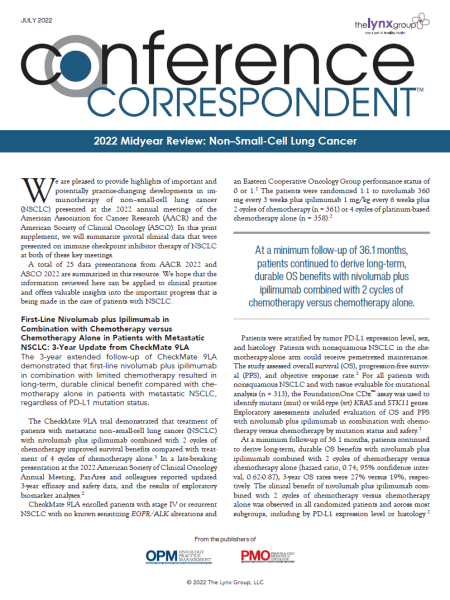Overall response rate, duration of response, and media progression-free survival were highest in the group of treatment-naïve patients with T790M negativity and any MET mutation.
EGFR T790M mutation followed by MET dysregulation accounts for approximately 60% of patients with EGFR-mutant non–small-cell lung cancer (NSCLC) who progress with EGFR tyrosine kinase inhibitors (TKIs).1 Capmatinib, an oral agent that inhibits MET, was evaluated in a phase 1b/2 study in combination with nazartinib (an EGFR-TKI) for the treatment of EGFR-mutant NSCLC.2 During the ESMO Virtual Congress 2020, researchers reported phase 2 results in pretreated patients with EGFR-TKI resistance, with any T790M/MET mutation (group 1) and treatment-naïve patients with T790M negativity, any MET (group 3).1
The phase 2 study included 52 and 47 patients in groups 1 and 3, respectively.1 The recommended phase 2 dose (RP2D) was capmatinib 400 mg twice daily plus nazartinib 100 mg once daily. The primary end point was overall response rate (ORR); secondary end points included duration of response (DOR), progression-free survival (PFS), and overall survival (OS). The efficacy analysis was also stratified by MET status, for a combined group (N = 68) consisting of pretreated patients from group 1 and phase 1 patients treated at the RP2D.1
The ORR was highest in the treatment-naïve group 3 patients (61.7%; 95% confidence interval [CI], 46.4-75.5).1 Among the patients who progressed on EGFR-TKIs, the ORR was 28.8% (95% CI, 17.1-43.1) in the pretreated group 1 patients; in the MET-positive and MET-negative patients in the pretreated combined group, the ORR was 43.5% (95% CI, 23.2-65.5) and 27.9% (95% CI, 15.3-43.7), respectively. Similarly, the median DOR was highest in the treatment-naïve group 3 patients (11.6 months; 95% CI, 6.6-14.3). Among the patients who progressed on EGFR-TKIs, the median DOR was 6.3 months (95% CI, 3.7-10.8) in the pretreated group 1 patients; in the MET-positive and MET-negative patients in the pretreated combined group, the median DOR was 6.3 months (95% CI, 3.6-10.8) and 9.3 months (95% CI, 3.7-40.4), respectively.1
The median PFS was also highest in the treatment-naïve group 3 patients (11.0 months; 95% CI, 7.6-13.8).1 Among the patients who progressed on EGFR-TKIs, the median PFS was 5.6 months (95% CI, 3.7-7.4) in the pretreated group 1 patients; in the MET-positive and MET-negative patients in the pretreated combined group, the median PFS was 7.7 months (95% CI, 5.4-12.2) and 5.4 months (95% CI, 3.5-6.4), respectively. Similarly, the median OS was longest in the treatment-naïve group 3 patients (not estimable [NE]; 95% CI, 15.9 months-NE). Among the patients who progressed on EGFR-TKIs, the median DOR was 6.3 months in the pretreated group 1 patients; in the MET-positive and MET-negative patients in the pretreated combined group, the median DOR was 6.3 months and 9.3 months, respectively.1
In groups 1 and 3, the most frequent treatment-related adverse events of any grade were peripheral edema (50% vs 57.4%, respectively), nausea (42.3% vs 48.9%, respectively), and diarrhea (23.1% vs 46.8%, respectively).1 The researchers concluded that the addition of a MET inhibitor (capmatinib) to an EGFR-TKI (nazartinib) demonstrated clinically relevant efficacy and was well tolerated in patients with EGFR-mutant NSCLC who progress on EGFR-TKIs.1
Reference
- Felip E, et al. ESMO 2020. Abstract 1284P.
- Wolf J, Seto T, Han JY, et al. Capmatinib in MET exon 14-mutated or MET-amplified non-small-cell lung cancer. N Engl J Med. 2020;383(10):944-957.

